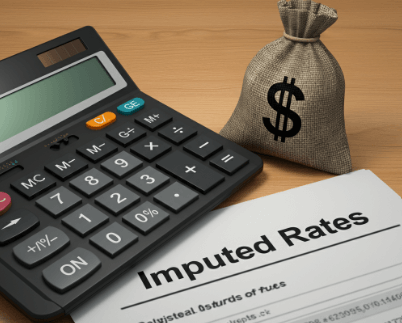What is Imputed Interest Rates? Imputed interest rates are the hypothetical rates of return on investments or loans, inferred or estimated based on the value of goods or services provided rather than explicitly stated in a contractual agreement. In the financial world, “What is Imputed Interest Rates” often emerges as a complex yet crucial topic many individuals struggle to comprehend.
This blog aims to demystify the nuances of “What is Imputed Interest Rates” and elucidate how understanding this concept can significantly augment your financial knowledge. Whether you’re a seasoned investor, a student of finance, or someone keen on elevating your financial acumen, grasping the intricacies of imputed interest rates will provide you with an invaluable tool for making informed decisions in both personal and professional financial contexts. Join us as we unravel the layers of imputed interest rates, providing valuable insights and enhancing the understanding of a subject crucial to the dynamics of loans, investments, and financial planning.
Steve Daria and Joleigh, notable real estate investors, have leveraged their understanding of imputed interest rates to secure advantageous financing options and optimize their investment returns. Their remarkable journey exemplifies how mastering this financial concept can elevate investment strategies.
Understanding What is Imputed Interest Rates
At its core, the imputed interest rate refers to an interest rate considered or assumed to exist on a financial instrument, even if the interest is not explicitly stated.
The Internal Revenue Service (IRS) often uses this concept to ensure that lenders and borrowers recognize and report interest income and expense for tax purposes on loans that might not necessarily have a formal interest payment structure.

Why Imputed Interest Rates Matter
Understanding what is imputed interest rates is crucial for financial analysts, mortgage seekers, real estate investors, Florida residents, and house sellers.
It influences how certain transactions are taxed, affects the valuation of loans and investments, and has implications for cash flow and financial planning.
Get An Offer Today, Sell In A Matter Of Days
The Impact on Real Estate
The imputed interest rate can significantly affect real estate investment and house selling.
For instance, if a seller provides financing to the buyer below the market interest rate, the IRS may impose a higher interest rate on the loan, affecting the taxes both parties need to pay.
Strategies for Navigating Imputed Interest Rates
Navigating the complexities of imputed interest rates can significantly impact your financial strategy and tax obligations.
This section will explore practical approaches to effectively understand and manage imputed interest rates, enhancing financial literacy and decision-making.
For Mortgage Seekers
When you’re in the market for a mortgage or exploring seller-financed transactions, it’s crucial to have a keen awareness of the prevailing AFR (Applicable Federal Rate) as published by the IRS.
The AFR serves as a standard for determining the minimum interest rates that should be charged on various types of loans to avoid potential tax consequences.
Borrowing at rates below the AFR can trigger imputed interest income, which essentially means that the IRS imputes or assumes interest income on the loan, even if little to no interest is paid.
For Real Estate Investors
For investors, comprehending the impact of the imputed interest rate on their return on investment (ROI) is crucial.
When structuring seller-financed deals or any lending arrangements, aligning the interest rates with the prevailing AFRs (Applicable Federal Rates) set by the IRS is essential.
By doing so, investors can lower the risk of encountering unexpected tax consequences that may erode their potential returns.
For Sellers
If you’re contemplating seller financing to facilitate a quicker sale, it’s paramount to acquaint yourself with the Applicable Federal Rate (AFR).
Established by the IRS, this benchmark dictates the minimum interest rate charged on such transactions to avoid potential tax implications.
Setting the interest rate too low in seller financing arrangements risks triggering imputed interest as per the AFR and can also impact the profitability of the sale as a whole.
Here’s why understanding and adhering to the AFR is crucial:
- Avoiding Imputed Interest: When the interest rate on seller-financed deals falls below the AFR, the IRS may impute additional interest income to the seller. This means that even if the interest charged is minimal or nonexistent, the IRS might assess taxes on the imputed interest income, potentially leading to unexpected tax obligations.
- Preserving Profitability: Setting the interest rate too low can erode the seller’s profitability. While offering a competitive interest rate may attract buyers and expedite the sale, it’s important to strike a balance that secures fair compensation for the seller while remaining compliant with tax regulations.
Tips for Dealing with Imputed Interest Rates
This section offers practical tips on handling imputed interest rates, a vital yet commonly neglected element in financial planning.
- Stay Informed About AFR: The IRS updates these rates monthly. Being abreast of these changes can help you make informed decisions.
- Consult a Tax Professional: Imputed interest rates can have significant tax implications. It’s always wise to consult with a tax advisor to understand the impact on your specific situation.
- Use IRS-Published Rates: Using rates at or above the AFR minimizes the risk of imputed interest for private loans or seller financing.

Frequently Asked Questions about ‘What is Imputed Interest Rates’
Here, you’ll find a comprehensive list of frequently asked questions that address the most common inquiries regarding imputed interest rates, providing you with the answers you might be looking for.
What is the Applicable Federal Rate (AFR)?
The AFR is the minimum interest rate the IRS requires for private loans.
It’s updated monthly and varies depending on the loan’s length.
How Does Imputed Interest Affect My Taxes?
Imputed interest is treated as income by the IRS.
If you’re lending money under the AFR, the IRS may calculate and tax the interest you should have received, regardless of whether you collected it.
Can Imputed Interest Rates Affect All Types of Loans?
From familial loans to seller finances in real estate transactions, imputed interest rates can impact taxes and cash flow.
Conclusion
The world of finance is rife with complex terms and concepts, but understanding the basics and keeping informed about changes can make a significant difference in your financial decisions. The imputed interest rate may seem like a small detail initially, but it has far-reaching implications that should not.
**NOTICE: Please note that the content presented in this post is intended solely for informational and educational purposes. It should not be construed as legal or financial advice or relied upon as a replacement for consultation with a qualified attorney or CPA. For specific guidance on legal or financial matters, readers are encouraged to seek professional assistance from an attorney, CPA, or other appropriate professional regarding the subject matter.

